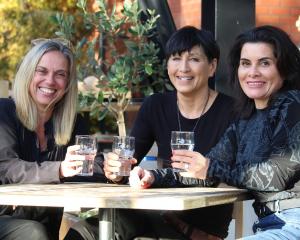It continues solidly for the next 40 minutes, all the way to Christchurch, passing hundreds of cars waiting at to fill up at a Templeton service station - the nearest petrol pumps to the city.
When the city is reached the gridlock appears to have largely cleared.
In Hagley Park there is more traffic heading away from the city centre, this time on foot.
Walking through the soggy, cracked bog that used to be the Hagley Park golf course are lines of well-to-do looking people wrapped in blankets, some dragging suitcases, some with nothing more than a pillow.
They are hotel refugees, their hotels evacuated; and with the nearest welfare centre full, they have taken up a stranger's offer to sleep on her floor.
''I don't know where we are going,'' says one. ''But anywhere is better than there.''
He jerks his thumb back towards the city.
When we reach the welfare centre, we can see why a stranger's floor might be attractive.
More than 1500 people, many wearing black rubbish sacks, huddle under plywood planks, under plastic sheets.
Hundreds of others queue for food, water, portable toilets.
The tents set up for the Ellerslie Flower Show are clearly not going to shelter everyone.
And it is starting to rain.
It's not quite a third-world refugee camp, but after a night of rain and desperation, this morning it might resemble one.
Seven girls from Japan wish they were back in Japan.
Five people from Israel missed their flight at 5pm yesterday, but are at least grateful to be alive and uninjured after a building facade collapsed on them as they ran for their lives.
A Christchurch City Council worker reassures a group of British visitors that this is an extraordinary situation, that the whole country is thinking of them, and that they will be able to go back and get their belongings as soon as it is safe.
If they want to.
The emergency response is in full swing, she says.
The first job is to look after the basics and ensure people have food, water and shelter.
''They are all still in an extreme state of shock.''
She had just spoken with a group of neurologists in Christchurch for a convention.
''They are, of course, experts in trauma, and they are traumatised.''
People were coping with the trauma in their own ways. Quite a few people she had talked to had blanked the quake out.
''They know something dramatic and huge has happened, but it's like they were asleep and they just woke up here [at Hagley Park]. They have blanked it out.''
In some cases the natural leader in a couple has been so frightened the normally submissive partner has taken charge, she says.
Parents who had been keeping a brave face for their children were starting to break down last night.
Others were dealing with it with humour, and others again with extreme swings between emotions, from happiness to depression and back again.
''This sort of thing brings out the best and worst in people. They are still in shock. I expect they will be like that for several more days.''
At the emergency operations centre, set up in the Christchurch Art Gallery, aftershocks shudder the massive glass walls every few minutes, while dozens of men and women clad in orange and yellow, sporting spotlights on their helmets and wearing harnesses, depart and arrive in large groups.
More than 200 people will work through the night on dozens of smaller rescue operations, and half a dozen major ones.
A large grey air force plane flies over time and again, dropping off supplies and people, and helicopters buzz around the central city.
Bob Parker, John Key, Howard Broad and Phil Goff float around being briefed, and briefing the public via the media.
This is the middle of a ''major disaster in global terms'', Mr Parker tells the cameras.
Then he urges people to remain calm.
The situation is extremely grave.
There are still, they believe, 100 people trapped in buildings, and dozens of families are to get the news someone they love has died.
As people are pulled out of the rubble with lesser injuries, dozens of other families will rejoice.
''We are all frightened, we are all traumatised, we none of us know exactly what is going to happen next, so get together and support each other and remain calm and reassure each other through the night ahead,'' he says.
''We are all deeply, deeply worried. But we have to steel ourselves for the bad news tomorrow will bring.''





